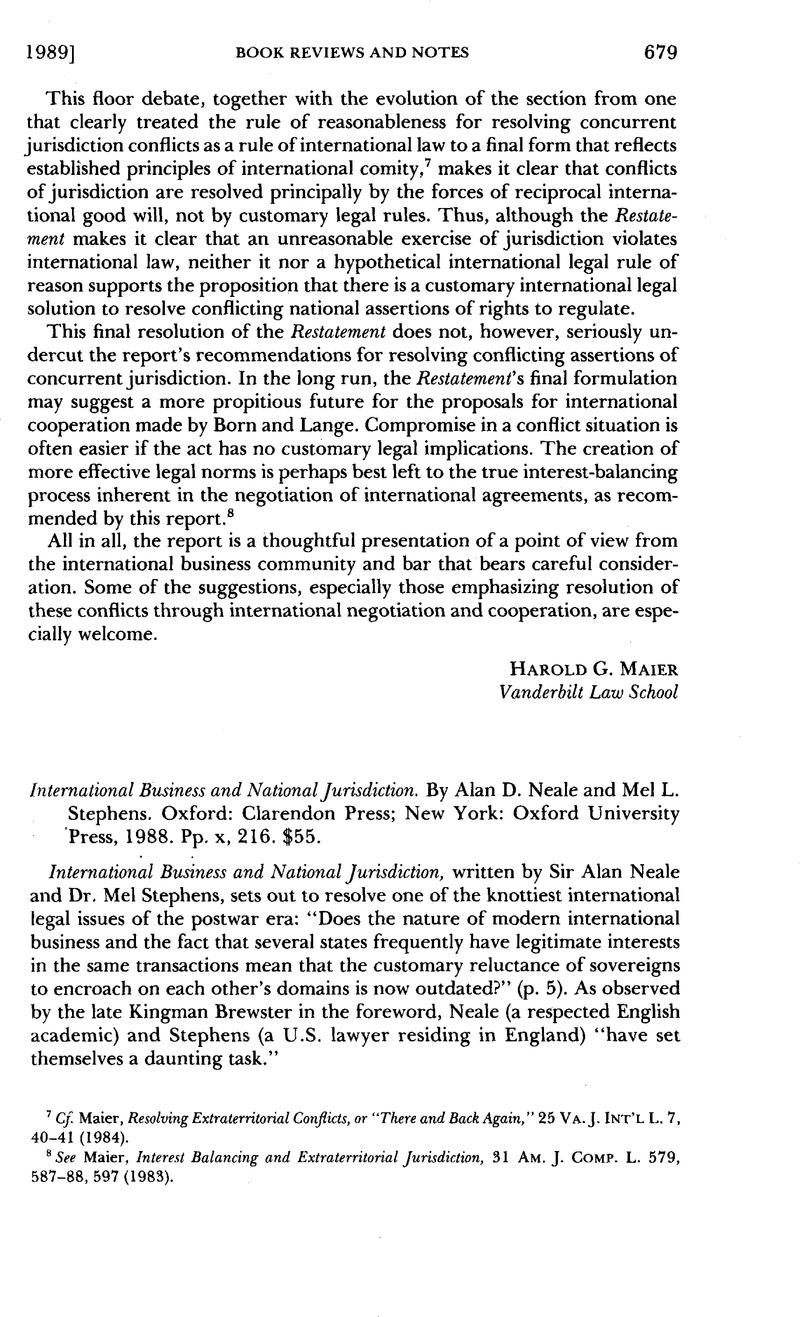No CrossRef data available.
Article contents
International Business and National Jurisdiction. By Alan D. Neale and Mel L. Stephens. Oxford: Clarendon Press; New York: Oxford University Press, 1988. Pp. x, 216. $55.
Published online by Cambridge University Press: 27 February 2017
Abstract

- Type
- Book Reviews and Notes
- Information
- Copyright
- Copyright © American Society of International Law 1989
References
1 J. Atwood & K. Brewster, Antitrust and American Business Abroad 21–48 (3d ed. 1985).
2 See Restatement (Third) of Foreign Relations Law of the United States §443 Reporters’ Note 11 (1987) [hereinafter Restatement (Third)].
3 See Alfred Dunhill of London, Inc. v. Republic of Cuba, 425 U.S. 682 (1976); Kalamazoo Spice Extraction Co. v. Provisional Military Gov’t of Socialist Ethiopia, 729 F.2d 422 (6th Cir. 1984); Callejo v. Bancomer, S.A., 764 F.2d 1101, 1115 n. 17 (5th Cir. 1985); Clayco Petroleum Corp. v. Occidental Petroleum Corp., 712 F.2d 404, 408 (9th Cir. 1983), cert. denied, 464 U.S. 1040(1984).
4 See Bazyler, Abolishing the Act of State Doctrine, 134 U. Pa. L. Rev. 325 (1986); Halberstam, Sabbatino Resurrected: The Act of State Doctrine in the Revised Restatement of U.S. Foreign Relations Law, 79 AJIL 68 (1985). Apart from their difficulties with the relationship between the act of state and foreign sovereign immunity doctrines, the authors make several nice points about the inconsistency between the territorial basis of the act of state doctrine and the foreign compulsion defense and the extraterritorial application of the antitrust laws.
5 See Restatement (Third), supra note 2, §442 comment a; Trade Dev. Bank v. Continental Ins. Co., 469 F.2d 35, 40–41 (2d Cir. 1982); Garpeg, Ltd. v. United States, 583 F.Supp. 789
(S.D.N.Y. 1984); Minpeco, S.A. v. Conticommodity Servs., Inc., 116 F.R.D. 517 (S.D.N.Y. 1987).
6 The authors do, however, appear to be unduly harsh in their assessment of judicial acceptance of the rule of reason. See O.N.E. Shipping Ltd. v. Flota Mercanta Grancolombiana, 830 F.2d 449 (2d Cir. 1987); Star-Kist Foods Inc. v. P.J. Rhodes & Co., 769 F.2d 1393 (9th Cir. 1985); Montreal Trading Ltd. v. Amax Inc., 661 F.2d 864 (10th Cir. 1981); Mannington Mills v. Congoleum Corp., 595 F.2d 1287 (3d Cir. 1979); Restatement (Third), supra note 2, §403. The Supreme Court’s application of principles of international comity to extraterritorial U.S. discovery in Societe Nationale Industrielle Aerospatiale v. U.S. District Court, 107 S.Ct. 2542 (1987), also presages some form of comity-based restraint in the antitrust context.
7 107 S.Ct. 1026, 1035 (1987).
8 Lakeside Bridge & Steel Co. v. Mountain State Constr. Co., 445 U.S. 907, 911 (1980) (White, J., dissenting from denial of certiorari). See also Abrams, Power, Convenience and the Elimination of Personal Jurisdiction in the Federal Courts, 58 Ind. L.J. 1 (1982).
9 As the court remarked in Timberlane Lumber Co. v. Bank of America, 549 F.2d 597, 612 (9th Cir. 1976), “the requirement for a ‘substantial’ effect may silently incorporate these additional considerations [i.e., “comity and the prerogatives of other nations”], with ‘substantial’ as a flexible standard that varies with other factors.” Put differently, determining when foreign acts are sufficiently “purposefully directed” towards the United States to sustain jurisdiction will almost inevitably lead to either explicit or sub silentio consideration of issues such as the extent of effects in the United States, the competing governmental interests of the United States and other nations, and other similar factors.
10 See G. Born & D. Westin, International Civil Litigation in U.S. Courts 56–69 (1989).
11 See Akehurst, Jurisdiction in International Law, 46 Brit. Y.B. Int’l L. 145 (1974).
12 This is not to say that the exercises of legislative jurisdiction in Lotus and Alcoa cannot satisfactorily be distinguished. Indeed, reference to the factors in Timberlane and §403 provide a ready basis for such a distinction.


